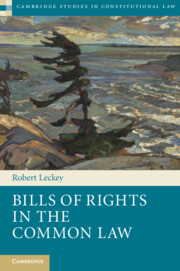Book contents
- Frontmatter
- Dedication
- Contents
- Acknowledgements
- Table of cases
- Introduction
- 1 Against bill-of-rights exceptionalism
- 2 The common law, judging, and three bills of rights
- 3 Judicial review of legislation before bills of rights
- 4 Bills of rights and other means of accessing judgment
- 5 Putting the strike-down in its place
- 6 Remedies from text to practice
- 7 Improving the system and engaging the legislature
- 8 Rethinking remedies and constitutional supremacy
- Conclusion
- Bibliography
- Index
3 - Judicial review of legislation before bills of rights
Published online by Cambridge University Press: 05 May 2015
- Frontmatter
- Dedication
- Contents
- Acknowledgements
- Table of cases
- Introduction
- 1 Against bill-of-rights exceptionalism
- 2 The common law, judging, and three bills of rights
- 3 Judicial review of legislation before bills of rights
- 4 Bills of rights and other means of accessing judgment
- 5 Putting the strike-down in its place
- 6 Remedies from text to practice
- 7 Improving the system and engaging the legislature
- 8 Rethinking remedies and constitutional supremacy
- Conclusion
- Bibliography
- Index
Summary
This chapter resists bill-of-rights exceptionalism, responding to the mistaken understanding of the novelty of judicial power to review legislation under a bill of rights. It makes two contributions. The first concerns the pedigree of judicial review of legislation: far from being novel, the judicial practice of invalidating legislation has a long history. The judicial role within the Commonwealth tradition, introduced in Chapter 2, has included reviewing legislation and declaring it invalid for colliding with a superior norm since long before the recent adoption of bills of rights. As this chapter demonstrates, prior to the bills of rights, Commonwealth judges engaged in essentially the same activity of judicial review of legislation in three legal contexts. Applying a bill of rights to legislation is thus potentially continuous with that Commonwealth tradition.
The chapter's second contribution addresses the manner of invalidating legislation. In rights review, substantial novelty arises in how judges invalidate legislation, notably, in the temporal reach of their declarations and the factors that they admit as relevant. This chapter provides historical background that, combined with Chapters 5 and 6, will substantiate this point. When reviewing legislation before the bills of rights, the judges tradition- ally awarded the same sanction for an offending enactment: they declared offending legislation invalid, in an order that was immediate and retrospective. Controversy over the source or appropriateness of judicial review of legislation did not seep into remedial questions. For the most part – and the exception is secondary legislation – judges did not understand the remedial stage as a site of judicial discretion regarding the character of a declaration of invalidity. At that stage, they did not refer to doubts about the legitimacy of judicial review, to questions about their capacity relative to other branches of government, or to the consequences of a law's invalidity.
- Type
- Chapter
- Information
- Bills of Rights in the Common Law , pp. 52 - 67Publisher: Cambridge University PressPrint publication year: 2015

